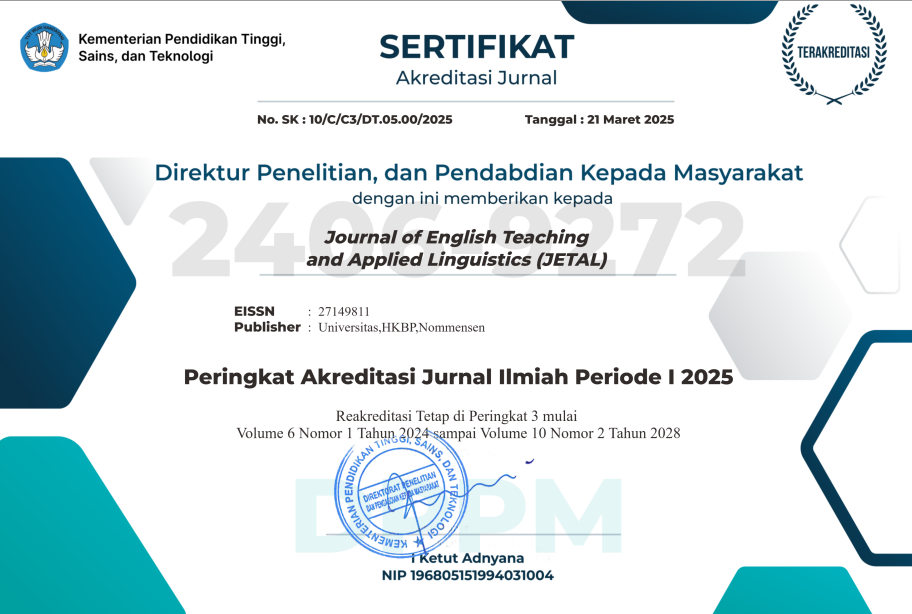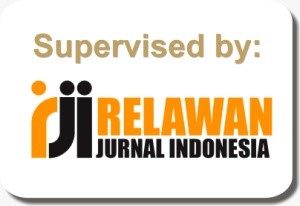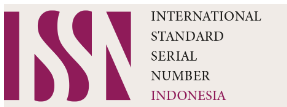Unlocking Fluent Speech: Enhancing Student Speaking Skills through Digital Storytelling
Abstract
This study evaluates the impact of digital storytelling on improving college students' speaking skills, based on Vygotsky’s Social Constructivism, which emphasizes the role of social interaction and cultural tools in learning.
Using a quasi-experimental design, 60 fourth-semester students at the Islamic Institute of Sunan Kalijogo Malang were divided into an experimental group and a control group. The experimental group from the Faculty of Islamic Da'wah and Broadcasting engaged in digital storytelling, while the control group, including students from the Tarbiyah and Teaching Faculty, did not. Narrative texts such as fairy tales and fables were used in the intervention.
The experimental group showed a significant improvement in speaking skills, with their mean post-test score increasing from 55.39 to 61.72, compared to a decrease in the control group's score from 57.01 to 55.12.
Digital storytelling effectively enhances students' speaking skills by providing engaging, interactive learning experiences. The study supports the integration of digital storytelling into language instruction to improve oral communication abilities
References
Cohen, L., Manion, L., & Morrison, K. (2018). Research Methods in Education (8th ed.). Routledge.
Creswell, J. W., & Creswell, J. D. (2017). Research Design: Qualitative, Quantitative, and Mixed Methods Approaches (5th ed.). Sage Publications.
Dunlap, J. C., & Lowenthal, P. R. (2009). Using multimedia to engage students in learning. In The Handbook of Research on Educational Communications and Technology (pp. 549-562). Springer.
Huang, C., & Chen, T. (2022). Enhancing English speaking skills through digital storytelling: A study on language learners in higher education. Journal of Language Teaching and Learning, 12(3), 215-230
Lee, J., & Kim, H. (2020). Reducing public speaking anxiety with digital storytelling: A case study. TESOL Quarterly, 54(1), 79-95.
Li, X., & Liu, Y. (2020). The impact of speaking anxiety on college students' English speaking proficiency. Asian EFL Journal, 22(4), 56-72.)
Ohler, J. (2020). Digital storytelling in the classroom: New media pathways to literacy, learning, and creativity. Corwin Press.
Piaget, J. (1973). To Understand is to Invent: The Future of Education. Viking Press.
Schneider, E. F., & Mertins, D. (2021). Digital Storytelling in the Classroom: Creating, Sharing, and Reflecting on Learning. Springer.
Robin, B. R. (2020). The power of digital storytelling: A framework for educators. Educational Technology Research and Development, 68(1), 109-126.
Robin, B. R. (2008). The effective use of digital storytelling as a pedagogical tool. ERIC Digest.
Rodriguez, A., Garcia, M., & Thompson, P. (2020). Collaborative learning and digital storytelling: Benefits for speaking proficiency. International Journal of Language Education, 22(4), 112-125.
Schneider, E. F., & Mertins, D. (2021). Digital Storytelling in the Classroom: Creating, Sharing, and Reflecting on Learning. Springer.
Smith, R., & Zhou, L. (2020). Enhancing oral communication skills through digital storytelling in language classrooms. Language Learning & Technology, 24(2), 30-47.
Tuan, L. T., & Doan, D. T. (2020). Investigating college students' speaking difficulties and their solutions. Journal of English Language Teaching and Linguistics, 5(2), 183-196.
Vygotsky, L. S. (1978). Mind in Society: The Development of Higher Psychological Processes. Harvard University Press.
Zubair, M., & Saleem, M. (2020). The impact of digital storytelling on language acquisition: An empirical study. Journal of Educational Technology, 15(3), 45-58.

This work is licensed under a Creative Commons Attribution-ShareAlike 4.0 International License.
Authors retain copyright and grant the journal right of first publication with the work simultaneously licensed under a Creative Commons Attribution-ShareAlike 4.0 International License (CC BY-SA 4.0) that allows others to share the work with an acknowledgment of the work's authorship and initial publication in this journal.
Authors are able to enter into separate, additional contractual arrangements for the non-exclusive distribution of the journal's published version of the work (e.g., post it to an institutional repository or publish it in a book), with an acknowledgment of its initial publication in this journal.
Authors are permitted and encouraged to post their work online (e.g., in institutional repositories or on their website) prior to and during the submission process, as it can lead to productive exchanges, as well as earlier and greater citation of published work (See The Effect of Open Access).






